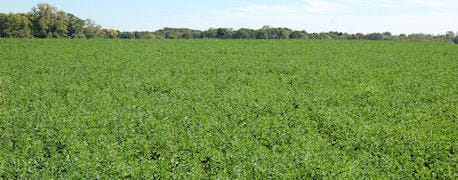
Alfalfa represents a big investment because seed is expensive. If it's not expensive, ask why. Make sure you're not buying an old variety, such as Vernal. It was big in its day, but newer varieties produce more tonnage and last longer. The seed also costs more.
This is how Chris Parker, Morgan County Extension ag educator, looks at how you should evaluate whether you're buying the alfalfa seed that can give you the most bang for your buck. Parker also grows and harvests hay for his beef herd, and writes Forage Notes in Indiana Prairie Farmer.

Good result: To get an alfalfa field that produces hay like this one, you need to plan ahead and make sure the field is in good shape first.
The biggest decision you need to make is if you should be choosing and seeding alfalfa in the first place, Parker says. It may still be the "queen of forages," but it's not the only forage. There are situations where other forages fit better.
Next, make sure alfalfa is a good match for the field you're getting ready to seed in the first place. Alfalfa simply will not perform well on poorly drained soils. Heaving of crowns will be an issue in the winter almost every year, and the stand will be short-lived. You risk not getting a good return on your long-term investment in seed if you plant on wet soils, Parker says.
Whole-field tile systems could make flatter fields acceptable. But if the field isn't tiled correctly and is poorly drained, consider seeding another forage instead. Red clover may be your best option. It's suitable to most types of livestock, except ewes. Red clover can interfere with normal reproductive cycles in sheep.
If you're going to add a grass to alfalfa, consider orchardgrass. Stay away from tall fescue, especially Kentucky 31 tall fescue, he says. There are better options than that species, Parker concludes.
About the Author(s)
You May Also Like




